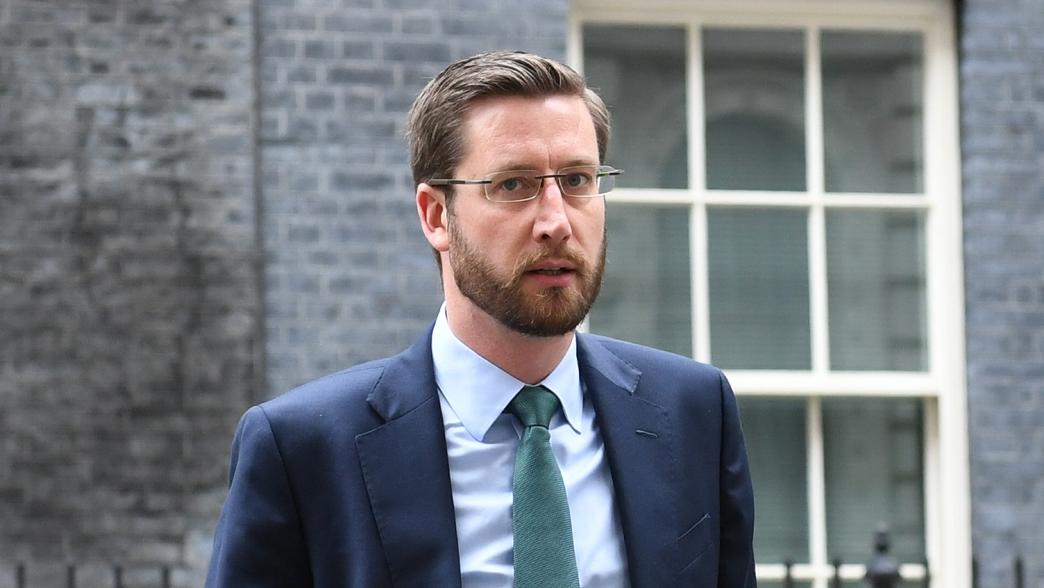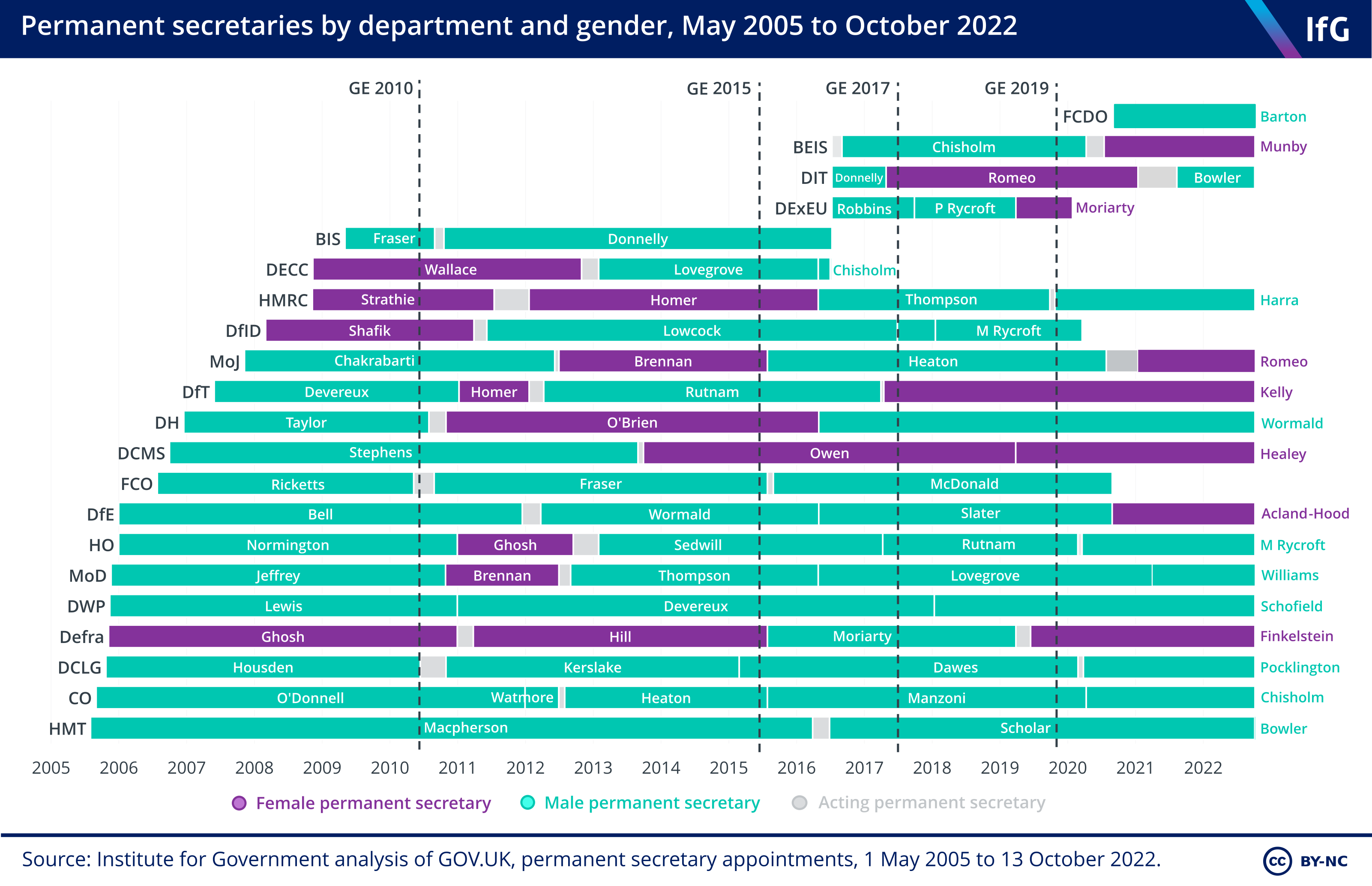Permanent secretaries
This explainer looks at the role of permanent secretaries, the most senior rank of civil servant.

What is a permanent secretary?
A permanent secretary is the most senior rank of civil servant. They include officials who head government departments, but there are other civil servants who are also permanent secretary grade. They include some senior ambassadors, security agency leaders and the heads of some non-ministerial departments, for example the national statistician at the Office for National Statistics. It can also be a title sometimes given to senior officials in the Cabinet Office and No.10.
Some departments also have a ‘second permanent secretary’ who is the second most senior official in a department, but also holding a permanent secretary rank.
The next grade down from permanent secretary is director general.
How are permanent secretaries appointed?
Permanent secretaries are formally appointed by the prime minister, who is the minister for the civil service. However, the Constitutional Reform and Governance Act 2010 requires that all such appointments must ‘be on merit on the basis of fair and open competition’, meaning that appointments should not be political choices. In practice the process is managed by officials with the views of ministers taken into account. Candidates who are deemed appointable (“over the line”) are presented to the prime minister who takes the final choice from a list of those suitable for the job.
The first civil service commissioner, with support from senior permanent secretaries, the cabinet secretary and sometimes non-executive directors of departments manage the process. The Civil Service Commission oversees civil service recruitment and monitors appointments.
Appointments are usually expected to include an open competition where potential candidates can apply. These have often been ‘internal’ competition, meaning that only civil service candidates can apply, but more recent ‘external’ competitions have meant that people outside the civil service can also put their names forward.
Some permanent secretaries are appointed through ‘managed moves’, where a civil servant is moved into a vacancy of the same grade without any competition. The Senior Leadership Committee makes the decision about whether a vacancy should be filled by managed move or competition. It is supposed to use managed moves only when there is a business case for it, for example if it is urgent, if there is an obvious candidate or where there is a risk in losing a highly skilled candidate.
How many permanent secretaries are there?
Government does not publish a single list of permanent secretaries, but based on multiple sources (the government’s high-earners dataset, the list of accounting officers, an answer to a parliamentary question), there are around 40 permanent secretaries. These include the most senior officials in each government department and the devolved administrations; second permanent secretaries at the Treasury, Home Office, the Department for International Trade and HMRC; senior officials in the intelligence services and the law (such as the director of public prosecutions at the Crown Prosecution Service); and other senior officials including the chief medical officer, chief scientific adviser, national statistician and first parliamentary counsel.

What do permanent secretaries do?
Permanent secretaries who lead departments have a role that includes:
- policy adviser, particularly to their secretary of state
- day-to-day management of the department and its budget
- leadership of the department and oversight of its agencies and arm’s-length bodies
- managing their senior team
Permanent secretaries also have other corporate duties. Some more senior ones sit on boards that oversee the management of the civil service including the Civil Service Board and the Senior Leadership Committee. Others also head up civil service professions and functions, overseeing the development of staff, reforms and leadership of those civil servants who sit in that profession or function.
Permanent secretaries also meet every week at a ‘Wednesday Morning Colleagues’ (WMC) meeting chaired by the cabinet secretary and held in the Cabinet Office.
How powerful are permanent secretaries?
Permanent secretaries can be very influential, both as the most senior policy adviser to ministers and through the executive leadership responsibilities they hold. They can also be important spokespeople for their departments inside and outside the civil service. However, in all cases they serve the minister who leads their department. If a permanent secretary does not agree with a decision where they feel public money will be inappropriately spent, they can seek a ‘letter of direction’ which means that the minister instructs them to proceed.
How much are permanent secretaries paid?
The vast majority of permanent secretaries earn between £150,000 and £200,000 a year. The cabinet secretary earns between £210,000 and £215,000. The best-paid permanent secretaries are the chief trade negotiator and second permanent secretary at DIT (£265-270,000) and the chief executive of Defence Equipment and Support at the Ministry of Defence (£280-285,000).
How are permanent secretaries held accountable?
Many permanent secretaries are also ‘accounting officers’ for their departments. This means that they must account to parliament for their organisation on four tests of ‘regularity, propriety, value for money and feasibility’. Permanent secretaries appear in front of the Public Accounts Commission to answer questions on their responsibilities.
Permanent secretaries will also be requested to appear in front of the select committee which oversee their department to answer questions on policy and management. But ministers are accountable to parliament for policy decisions and the outcome of policy.
Permanent secretaries also answer to their ministers but are not directly managed by them. Permanent secretaries are line managed by the cabinet secretary, head of the civil service (often a role held by the same person as the cabinet secretary) or chief executive of the civil service. Permanent secretaries are judged on performance by other civil servants and the cabinet secretary or head of the civil service, based also on feedback from their secretaries of state. Between 2013-14 and 2015/16 permanent secretary objectives were published by the Cabinet Office but have been superseded by Strategic Departmental Plans (SDPs). Permanent secretaries will also be set individual objectives that are not published.
Can ministers fire permanent secretaries?
Ministers have traditionally not directly fired permanent secretaries. The UK system of appointment by merit is intended to protect civil servants from losing their jobs for political reasons.
Some ministers have felt the system unduly protects civil servants from being held accountable for poor performance. Occasionally ministers fall out with their permanent secretaries or feel that a change at the top is needed. The informal practice is for the cabinet secretary and the prime minister to attempt to mediate and see if a solution can be found. There have been plenty of cases where a permanent secretary has been moved to another job, has retired with a payoff or been given a peerage or pay-out.
Recent departures have shown the willingness of the Johnson government to force permanent secretaries out of the job prematurely, without being formally fired.
Some departures have been very controversial. In March 2020 the permanent secretary at the Home Office, Sir Philip Rutnam, resigned and launched a claim for constructive dismissal against the Home Office. The cabinet secretary, Sir Mark Sedwill, announced his departure in June 2020 amidst heavy negative briefing in the papers against him and after reports that he was being forced out. In August 2020 the permanent secretary of the Department for Education, Jonathan Slater, left the civil service after the prime minister ‘concluded that there is a need for fresh official leadership at the Department for Education’ 4 Cabinet Office and Department for Education, Susan Acland-Hood made Acting Permanent Secretary at the Department for Education, 26 August 2020, www.gov.uk/government/news/susan-acland-hood-made-acting-permanent-secretary-at-the-department-for-education . Like Sedwill, Slater stepped down, so was not formally fired, but the decision appears to have been taken by the prime minister.
- Topic
- Civil service
- Keywords
- Civil servants Civil service reform
- Position
- Cabinet secretary Permanent secretary
- Department
- Cabinet Office
- Publisher
- Institute for Government